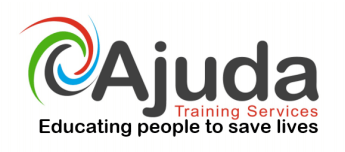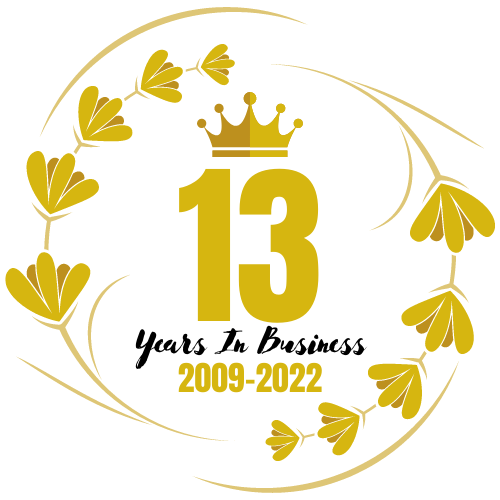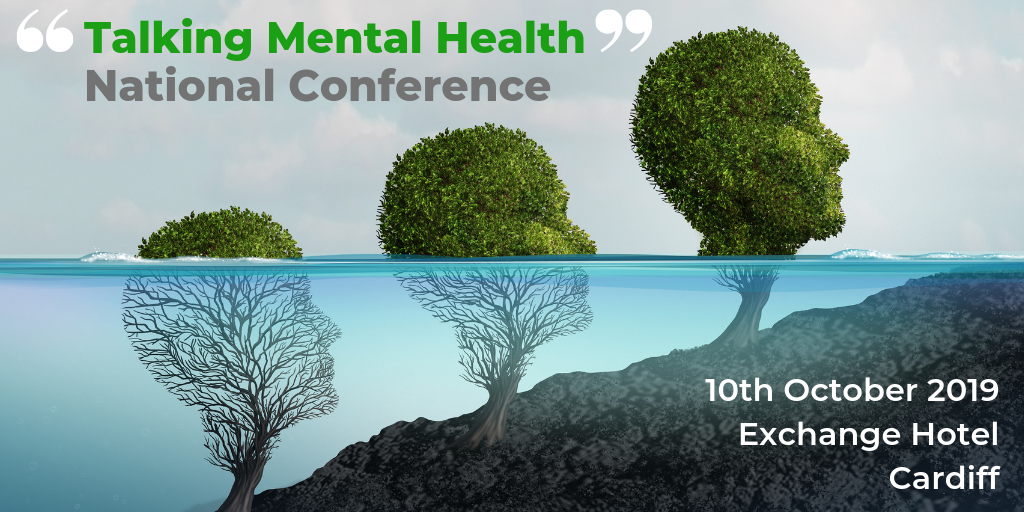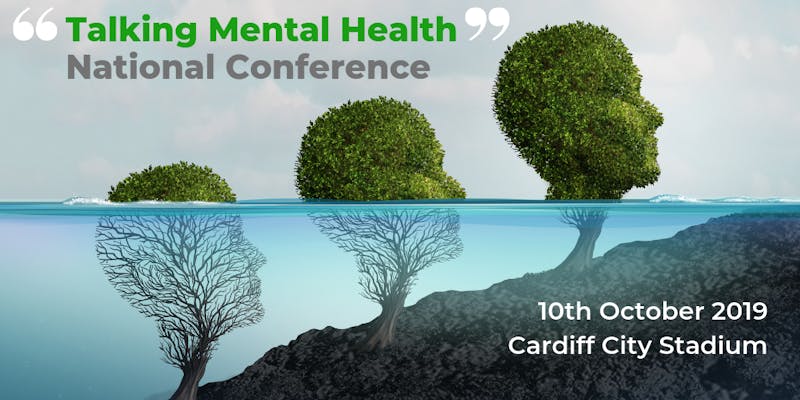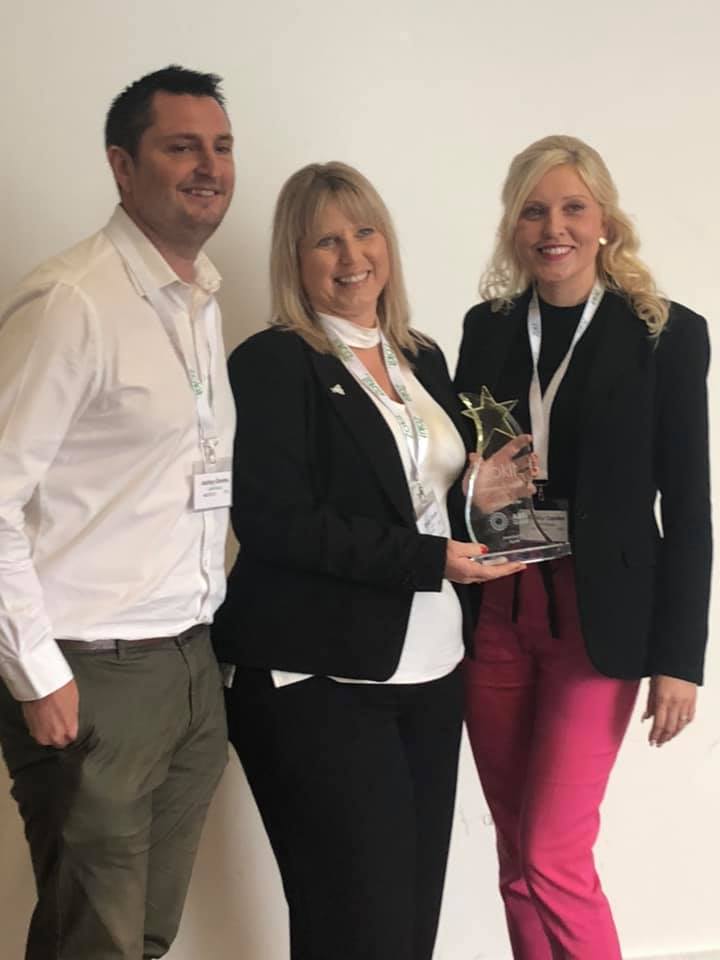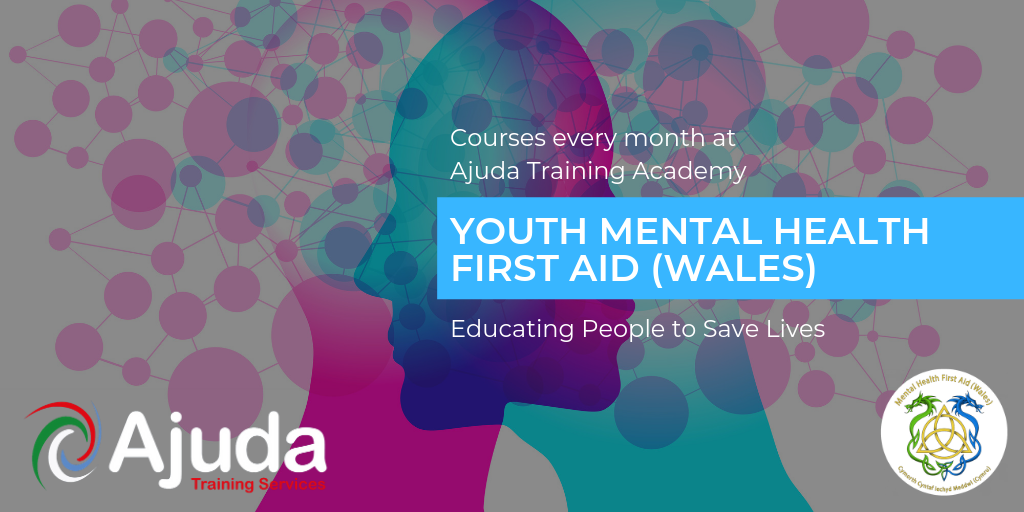Emotional Intelligence is a set of emotional and social skills that collectively establish how well you perceive and express yourself, maintain social relationships and cope with challenges. It’s not just a passing management fad, in fact it is based on a great body of data, based on studies of tens of thousands of working people taken from a wide range of industries. The research shows which qualities make a star performer and while Emotional Intelligence isn’t the sole predictor of performance potential, it has been proven to be a key indicator in this area. This course will introduce the concept of emotional intelligence and look at how you can use it in effective and meaningful ways. It will examine the difference between emotional intelligence and IQ and dispel some of the myths surrounding emotional intelligence. It contains a sections on the advantages and disadvantages of using emotional intelligence and considers the biological purpose for emotions and how best to manage them. Finally it will highlight the role played by emotions in the workplace and provide practical advice including tips for using emotional intelligence to deal effectively with emotions in situations that can arise in the workplace. Target Audience This course is aimed at supervisors and managers that want to develop more effective relationships with members of their teams. The course can be a great starting point for people new to their leadership role as well as more established This course is for individuals who are doing the training for themselves or for businesses who might want to put all of their first line management team through the training, so they are all working in the same way and have the same skill set. Advantages CPD approval means that this course can be used by those that need to prove they are continually developing themselves. Further Progression
Number of modules: 4 Course Duration: 50 Minutes Course Price: £65
Course information
managers that want to enhance their skills. This acts as a great introduction to the subject and covers the key concepts and theories relating to emotional intelligence.
Online training is flexible, efficient and cost effective meaning the candidate can progress through the modules at their own pace and in their own time, so they can fit the training in around their work and personal life
For candidates that want to add more qualifications to their CV our Leadership Skills course is ILM approved and can provide them with another recognised management qualification.
For candidates specifically interested in developing resilient teams our Developing Teamwork course goes hand in hand with this one and expands on some of the key ideas and how they can be applied to teams.
For candidates new to management roles Managing Meetings would be a great next step although working through any of our range of Business Skills courses would be valuable.
(Note: This is based on the video content shown and is rounded off. It does not account in any way for loading time or thinking time on the questions)
Author: Dawn Evans
Duty of Care
Course information
A duty of care is the requirement that all health and social care professionals, and organisations providing health and care services, must put the interests of service users first.
Working in the health and social care sector involves working with lots of different people with a variety of needs, dependencies, backgrounds and wishes. As a care worker, you have a duty of care towards all the people you are involved with, during your working hours. This means you have to employ a reasonable level of care, to ensure they are kept safe from harm, abuse and injury.
This course will give you an introduction to the concept of duty of care, cover how duty of care affects your work, what to do if you come across a duty of care dilemma and where to go for support or advice along with some practical examples of duty of care situations.

Number of modules: 6
Course Duration: 50 Minutes
(Note: This is based on the video content shown and is rounded off. It does not account in any way for loading time or thinking time on the questions)
Course Price: £25
Lockdown Procedure in Schools
Course information
In the last decade the threats to our society have multiplied and evolved in many ways. Terrorist organisations have transferred their fight from Iraq and Afghanistan to our back garden, Europe – and we have seen the damage that a small number of determined individuals can do.
This course will start by introducing the role of the lockdown officer then discuss some of the likely reasons for a lockdown, go over some of the steps you can take to prepare your school for lockdown as well as what to do in the event of a lockdown taking place.
Target Audience
The course is aimed at teachers, school administrators and support staff . It gives them an overview of what to expect and how to act in a lockdown situation and is intended to inform and prepare staff rather than alarm them.
Advantages
Being prepared and knowing how to handle an emergency situation can be invaluable as it means that proactive positive action can be taken to protect yourself and others in your care.
Online training is flexible, efficient and cost effective meaning the candidate can progress through the modules at their own pace and in their own time, so they can fit the training in around their work and personal life.
Further Progression
Other courses that complement this one include Prevent Duty, Positive Handling in Schools and Safeguarding Children.

Number of modules: 11
Course Duration: 60 Minutes
(Note: This is based on the video content shown and is rounded off. It does not account in any way for loading time or thinking time on the questions)
Course Price: £25
Ajuda launch a Mental Health conference
Talking Mental Health is a conference that shall be taking place on World Mental Health Day, Thursday 10th October 2019.
Dawn and Rachel are very passionate about sharing knowledge and advice about Mental Health, so this day will be filled with just that.
The conference will be held from 10am to 4pm at Cardiff City Stadium and will include;
- Keynote Speakers
- A day of Inspiration
- Free Resources
- Expert Knowledge
- Professional Advice
- Success Stories
- 2 Course Lunch
- Refreshments
Early bird tickets: £75 +VAT
Regular price: £95 +VAT
Learn lifesaving skills at Ajuda this June
Each month we provide courses at Ajuda Training Academy
June is jam packed with training courses that you can come along to from First Aid to Health, here’s the full calendar for this month
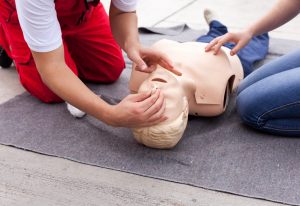
First Aid
3rd & 4th June – Level 3 Award in First Aid at Work Refresher (RQF)
17th June – Level 3 Award in Emergency First Aid at Work (RQF)
17th – 19th June – Level 3 Award in First Aid at Work (RQF)

Train the Trainer
10th – 12th June – First Aid Trainer / Assessor
13th June – Defib Instructor Course

Employment Skills
6th June – Interview Skills
20th June – Employability Skills

Mental Health
27th & 28th June – Mental Health First Aid (Wales) (Adult)

Health & Safety
24th June – Level 2 Award in Safe Moving & Handling (RQF)
25th – Level 2 Award in Fire Safety and Fire Marshal (RQF)
26th – Level 2 Award in Food Hygiene (RQF)
Book a course
Click here to book on a course online
Or speak to the team on 02920 576883
Ajuda wins Business of the Year Award at Business event
We are so thrilled and honoured to have won the Business of the Year award at the Zokit Spring Conf event last week at Cardiff City Stadium.
Dawn and Rachel attended the day to share awareness about the Mental Health First Aid courses that Ajuda are now offering and always love opportunities to talk to others and network in the business community.
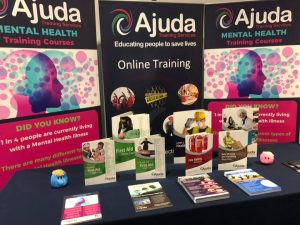


It was a fantastic day, with lots of knowledge and inspiration shared from other business owners. Dawn talked about her tips on how to run a successful and healthy business, and the room was full of other Entrepreneurs who wanted to take away some of her advice and knowledge.
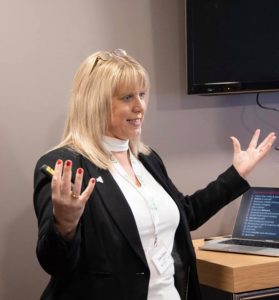
The awards took place at lunch time, after a delicious 3 course meal. There was a great buzz in the room of people enjoying the day, networking and those pre-awards excitement started to fill the room.
The awards were presented by Ruth Wignall, who is a trustee of the Charity of the day, Cancer Research Wales, who are a fantastic charity that both Dawn and Rachel have also fundraised for.
It was great to see all the fantastic businesses winning their awards and a huge congratulations to each of the well deserving winners.
The final award, Business of the Year, was presented by Ashley and Rayner Davies of A&R Group and when it was announced that Ajuda were the winners we couldn’t believe it!

Dawn collected her award on stage and said her thank you’s and we have been bursting with pride and gratitude since Thursday.
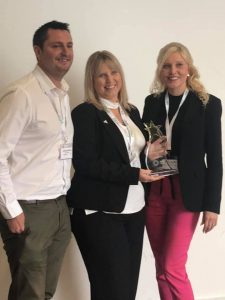
Thank you to everyone who chose us as the winner, we shall continute to grow as a business, training people with the life skills that really can help to save lives.
Ajuda launches Mental Health First Aid for Youth
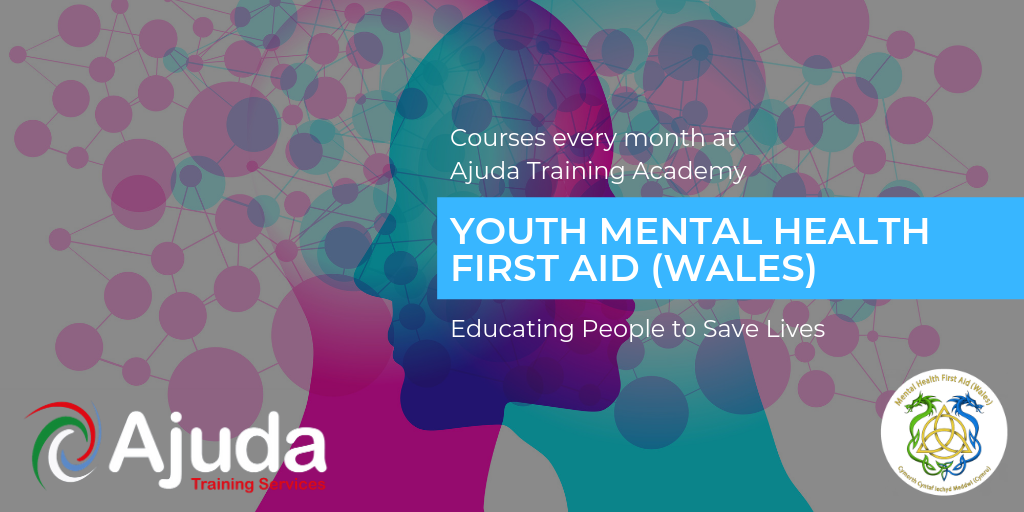
This 14 hour YMHFA (Wales) course teaches adults how to provide Mental Health First Aid to young people.
WHY YOUTH MENTAL HEALTH FIRST AID?
Mental illnesses often start in adolescence or early adulthood and it is important to detect problems early to ensure the young person is properly treated and supported. The YMHFA (Wales) course teaches adults who have frequent contact with adolescents, such as parents, guardians, school staff, sport coaches and youth workers, how to assist adolescents who are developing a mental health problem, experiencing a worsening of a mental health problem or in a mental health crisis.
The Government Green Paper ‘Transforming children and young people’s mental health provision’ plans for every school and college to have a designated lead in mental health by 2025. The designated Youth Mental Health First Aider will be a trained member of staff who is responsible for the school’s approach to mental health.
This course is designed to meet this requirement by providing you with a clear understanding of the role of the school mental health lead. This step-by-step course will take you through essential skills needed to develop a multidisciplinary, whole systems approach through effective practice procedures to ensure the improvement of mental health and wellbeing in your school.
COURSE CONTENT & AIMS:
The YMHFA course teaches adults how to assist adolescents who are developing any of the following mental health problems, experiencing a worsening of an existing mental health problem or in a mental health crisis.
- Developing mental health problems including:
- Depression
- Anxiety problems
- Eating disorders
- Psychosis
- Substance use problems
- Mental health crises:
- Suicidal thoughts and behaviours
- Non-suicidal self-injury
- Panic attacks
- Traumatic events
- Severe psychotic states
- Severe effects from alcohol or other drug use
- Aggressive behaviours
- To raise awareness and understanding of mental health problems in young people
- To build confidence to help a young person experiencing a problem
- To preserve life where a young person may be a risk to themselves or others
- To provide help on a ‘First Aid’ basis
- To reduce the effect of a mental health problem and prevent the problem escalating
- To encourage early intervention and speedier recoveries
- To provide comfort to a young person experiencing mental distress
- To know where to refer the young person to for the right on-going help
It is designed to be interactive and participants are encouraged (if they wish) to share views and experiences. Whist sharing experiences can benefit the training experience participants must be aware that Mental Health First Aid is designed to help participants support others and is not intended as a therapy session for the participant. This is for the comfort for all participants.
Please note that due to the sensitive topics discussed within the training it is recommended that participants have a level of well-being before attending.
COURSE COST
£140 + vat per person or £1,400 + vat for an in-house course for up to 12 people
COURSE VENUE
We run this course monthly at Ajuda Training Academy in Cardiff Bay.
For in-house bookings we can deliver this anywhere in Wales, for groups between 6-12 participants.
LENGTH OF COURSE
2 days / 14 hours
It is recommended that these 2 days are run consecutively however they can be spread across a maximum of 2 sessions within 3 weeks.
WHAT IS INCLUDED
We provide a fully qualified, experienced trainer, all the course materials, and certificates for participants on completion of the course.
BOOKINGS
To book a course or find out more information call Rachel on 029 20576883
Email: rachel@ajuda.org.uk
Food allergies can be life threatening to children
Do you know what the most common allergy is for children in the UK?
Would you know what to do if a child had a serve allergic reaction?
In children, the foods that most commonly cause an allergic reaction are:
- milk
- eggs
- peanuts
- tree nuts
- fish
- shellfish
Most children that have a food allergy will have experienced eczema during infancy. The worse the child’s eczema and the earlier it started, the more likely they are to have a food allergy.
Anaphylaxis is an extremely dangerous allergic reaction. Common triggers being the foods mentioned above.
In anaphlaxis, a chemical called histamine is over-produced, causing one of more life-threatening Airway, Breathing or Circulation problems.
How will I know if a child has an allergic reaction?
- Blotchy skin rash or flushing
- A rapid onset of one (or more) life-threatening Airway, Breathing or Circulation problems.
- Airway: Blood capillaries can ‘leak’ causing swelling and blockage. Look out for swelling of the tongue, lips, throat or a feeling of the throat ‘closing up’.
- Breathing: Wind-pipes can consist just like asthma
- Circulation: Blood vessels can dilate to 3 times their usual size, causing a life-threatening fall in blood pressure. Look out for dizziness, fainting, pale skin and a fast pulse.
What to do?
- Call 999/112 for emergency help.
- Lay the child down in a comfortable position
- If they feel light-headed or faint – DO NOT sit them up. Raise the legs if necessary.
- If the child has Airway or Breathing problems only, they may prefer to sit up; but take extreme care – if they feel light-headed or faint, lay them down immediately.
- The child may carry an auto-injector of adrenaline. This can save their life if it’s given promptly. The child may be able to inject this on their own but, if necessary, assist them to use it.
- If the child becomes unconscious check Airway and Breathing and resuscitate if necessary.
- The dose of adrenaline can be repeated at 5-15 minute intervals if there is no improvement or symptoms return
NOTE: In a childcare setting, an adult should ideally receive training from a qualified healthcare professional to enable them to safely administer the auto-injector in an emergency
How to manage stress in the workplace
Mental Health Awareness Week takes place every year and this year it is held on the 13th – 19th May 2019.
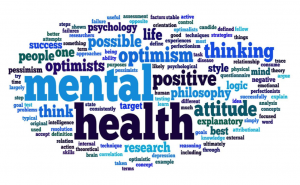
While some workplace stress is normal, excessive stress can interfere with your productivity and performance, impact your physical and emotional health, and affect your relationships and home life. It can even mean the difference between success and failure on the job.
According to the HSE (Health and Safety Executive), in 2015/16 over 480,000 people in the UK reported that work-related stress was making them ill. This amounts to nearly 40% of all work-related illness.

Many employees are reluctant to talk about stress at work. There is still a stigma attached to stress and people still think they will be seen as weak if they admit they are struggling. But stress is not a weakness and can affect anyone at any level of an organisation.
Some of the most common causes of workplace stress
- Fear of being laid off
- More overtime due to staff cutbacks
- Pressure to perform to meet rising expectations but with no increase in job satisfaction
- Pressure to work at optimum levels—all the time!
- Lack of control over how you do your work
How to deal with Stress?
At Ajuda we have compiled a list of things to do to help reduce Stress in the workplace.
- Reach out
Sometimes the best stress-reducer is simply sharing your stress with someone close to you. The act of talking it out and getting support and sympathy—especially face-to-face—can be a highly-effective way of blowing off steam and regaining your sense of calm. The other person doesn’t have to “fix” your problems; they just need to be a good listener.

- Talk to your colleagues
Try to develop good relationships with your colleagues – this can help to create a support network at work.

- Go for a walk at lunch time
Too many of us get into the bad habit of eating lunch at our work desk. This would mean that you spend all day at the computer and not allowing yourself to take a break. The best way to step away at lunch time is to leave the office and go for a walk. If you’re lucky enough to be close to a park then that is ideal, or just a walk around the block will help. Even if it is just for 10 minutes so you have time to sit down and eat your lunch.
Exercise is also very beneficial when it comes to stress and mental health.

- Have a healthy snack
During stressful times it’s easier to eat junk food or snack on crisps, sweets or chocolate. Try and go for fruit instead. You will start to feel much better. Eating small, frequent and healthy meals, for example, can help your body maintain an even level of blood sugar, keeping your energy and focus up, and avoiding mood swings. Low blood sugar, on the other hand, can make you feel anxious and irritable, while eating too much can make you lethargic.

- Get more sleep
Try going to bed and getting up at the same time every day, even on weekends. Aim for 8 hours a night—the amount of sleep most adults need to operate at their best. Turn off screens one hour before bedtime. The light emitted from TV, tablets, smartphones, and computers suppresses your body’s production of melatonin and can severely disrupt your sleep. Avoid stimulating activity and stressful situations before bedtime such as catching up on work. Instead, focus on quiet, soothing activities, such as reading or listening to soft music, while keeping lights low.

- Don’t take on too much
It’s ok to ask for help or say if you’re taking too much work on. Learn to say no if you can’t take on extra work or responsibility – make sure you’re able to explain why.

- Holidays
Work regular hours and take the breaks and holidays you’re entitled to – it’s important to take time off work.
Want to know more about Stress Awareness in the workplace?
We have an online training course that you can take
To find out more email the team at admin@ajuda.org.uk or give us a call on 02920 576883
Become a Mental Health First Aider
Mental Health First Aid (Wales)
Training Course
At Ajuda we have launched our Mental Health First Aid (Wales) Training Courses
WHAT IS MENTAL HEALTH FIRST AID?
Mental Health First Aid (MHFA) is an internationally recognised training course, designed to teach you how to spot the signs and symptoms of mental health conditions and provide help on a first aid basis.
WHAT WILL I LEARN ON THE COURSE?
What to say and do in a crisis.
Practice listening and responding.
How to apply the 5 steps of MHFA.
The importance of good listening skills.
Understanding recovery from mental health problems.
How to respond if you believe someone is at risk of suicide.
How to give immediate help until professional help is available.
Understanding the connection between mental health problems and alcohol and drugs.
Understanding the connection between mental health problems and discrimination.
Some basic information about common mental health problems Self-help
information.
WHERE, WHEN, HOW LONG?
The MHFA course takes 12 hours to complete over 2 consecutive days.
Held at Ajuda Training Academy or at a venue to suit you for group bookings of 6-12 delegates.
COURSE DATES
May 23rd & 24th
June 27th & 28th
July 25th & 26th
HOW MUCH?
The cost of the course is £120 +VAT per person
Or £1,200+VAT for a group of 12
VENUE ADDRESS
15 Mount Stuart Square, Cardiff Bay, CF10 5DP
GET IN TOUCH
02920 576883 admin@ajuda.org.uk www.ajuda.org.uk
Basic Fire Safety for Care Homes
This course will provide candidates with a general understanding of basic fire awareness including what should be done in the event of a fire, how to prevent a fire occurring and a basic introduction of the protocol of extinguishing a fire.
It is a cost effective way for employers to fulfil their legal obligation to provide their employees with the necessary understanding of fire awareness.

Number of modules: 5
Course Duration: 60 Minutes
(Note: This is based on the video content shown and is rounded off. It does not account in any way for loading time or thinking time on the questions)
Course Price: £25
Understanding Your Role in Care
Social care is the provision of social work, personal care, protection or social support
services to children or adults in need, or at risk, or adults with needs arising from illness,
disability, old age or poverty.
Choosing a job in health and social care means you want to make a difference to other
people’s lives by supporting and caring for them, so they can thrive and their quality of life is
enhanced.
To work in a professional manner and provide the best quality of care, you need to know the
duties, responsibilities and boundaries of your job.
This course will define social care and talk about why people choose it as a career and what
its goals and objectives are. It will also cover job descriptions, person centred care,
understanding code of practices and the basics of government legislation. Finally it will touch
on dealing with conflicts at work.

Number of modules: 7
Course Duration: 40 Minutes
(Note: This is based on the video content shown and is rounded off. It does not account in any way for loading time or thinking time on the questions)
Course Price: £25
